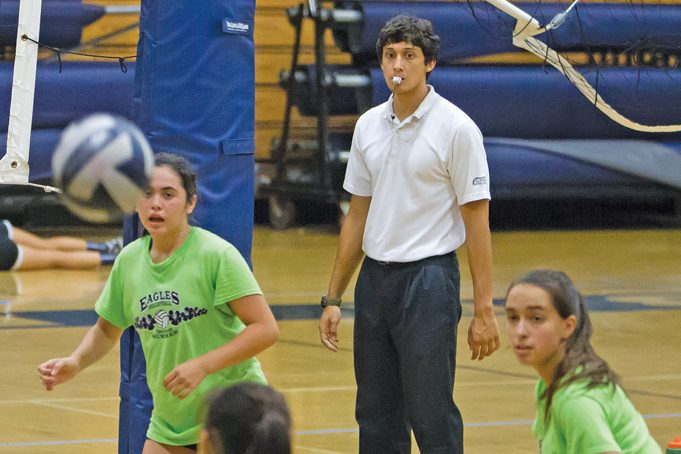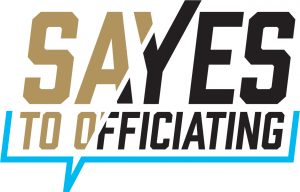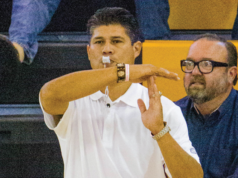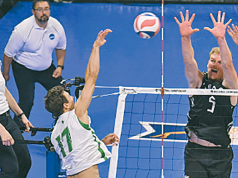Officials constantly hear the message that we need to recruit the next generation — younger people to follow in our footsteps. So many more young athletes are engaging in sports activities, but the number of new officials is not keeping up with the demand.
Getting someone to say “yes” to officiating is a big first step. However, the process of getting a newbie’s officiating career off the ground has many more steps if they want to make it successful journey.
What do new officials need to be successful from the start?
Basics
It may seem obvious to us, but a question as simple as, “Where do I go to find a uniform?” can be stumbling block for a new official. A new volleyball official needs red and yellow cards, a net chain, a ball gauge, a coin, a lineup card (NFHS), a pen, a rulebook, and of course, a whistle. Where do they find all that stuff, plus find a little bag to put all that stuff in? As you accumulate tools of the trade, make sure to pass your extras on to new officials to get them off and running.
Registration
Most prospective officials assume they are going to have to take a rules test somewhere along the way. The tough part for a new official can be the process for registering with all the appropriate organizations. A high school official needs to register with their state association, but there may also be a registration process with a local official’s organization. USAV requires registering with a USAV region, and the process includes background screenings and SafeSport classes to make sure our young athletes are protected. New collegiate officials may have yet another local association to join, plus registration with the NCAA and possibly NAIA. We need to help new officials wade through all these registration processes. We also need to explain why all this is necessary — from making sure they have liability insurance that covers them while traveling for a match to gaining exposure to the various training resources that are available to help with their journey.
Expectations
After all the proper registrations, the new referee will eventually get around to taking that exam. But that might be in conjunction with officials’ clinics, practice sessions and evaluation sessions that are required to be fully certified. Clarifying the expectations early for a new official can help avoid frustration. Outlining the training or rating sessions that are required may be a little scary to a newbie, but at least they know more about the curves in the road ahead.
Match Assignments
This is another big expectation that seems to get overlooked. After that whole certification process, many newbies assume they are ready to work the top matches or get to pick their assignments. Early on, mentors and assigners should let new officials know what to expect. You might find some junior club officials be quite surprised that they might have to work three matches in a row or work eight matches in a day, possibly for multiple consecutive days. A new official working a USAV tournament day will probably be surprised at how much time they spend on their feet. Welcome to the world of volleyball officiating!
Support
Many young officials refereed junior club ball on numerous occasions. They will quickly become aware, however, that there is something different about putting on the uniform, climbing the stand and knowing that the buck stops with them. The game they know well will be moving faster, and doubts about their rules knowledge may creep in. That’s when a new official needs the support of more experienced officials.
New referees know they have many things to work on. Receiving positive feedback on the things they are doing well is very important. Focus your constructive criticism on only the areas that a new official should work on to avoid overwhelming them with excess information.
No one wants to get yelled at, and that is frankly, why many people won’t take up the whistle. When several new officials are getting their feet wet, it’s important to be overly protective. If a region referee chair takes a big step of support by approaching “noisy” coaches early on, they can convince those coaches to back off, letting them know we need a little leeway for new officials to make mistakes on our way to training them for greatness.
Keep recruiting those new referees. We need to continue to grow the ranks. But know that just because you got one to say “yes,” the job is far from over.
Explore more information at https://www.sayyestoofficiating.com/.
What's Your Call? Leave a Comment:
Note: This article is archival in nature. Rules, interpretations, mechanics, philosophies and other information may or may not be correct for the current year.
This article is the copyright of ©Referee Enterprises, Inc., and may not be republished in whole or in part online, in print or in any capacity without expressed written permission from Referee. The article is made available for educational use by individuals.



















